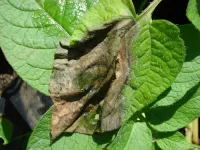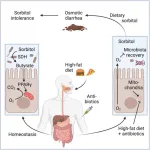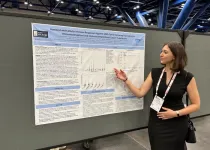(Press-News.org) An innovative treatment significantly increases the survival of people with malignant mesothelioma, a rare but rapidly fatal type of cancer with few effective treatment options, according to results from a clinical trial led by Queen Mary University of London.
The phase 3 clinical trial, led by Professor Peter Szlosarek at Queen Mary and sponsored by Polaris Pharmaceuticals, has unveiled a breakthrough in the treatment of malignant pleural mesothelioma (MPM), a rare and often rapidly fatal form of cancer with limited therapeutic options.
Mick’s journey with mesothelioma: “I have five grandchildren and two great-grandchildren now – I wouldn’t want to miss all that.”
The ATOMIC-meso trial, a randomised placebo-controlled study of 249 patients with MPM, found that a treatment – which combines a new drug, ADI-PEG20, with traditional chemotherapy – increased the median survival of participants by 1.6 months, and quadrupled the survival at 36 months, compared to placebo-chemotherapy.
The findings are significant, as MPM has one of the lowest 5-year survival rates of any solid cancer of around 5-10%. This innovative approach marks the first successful combination of chemotherapy with a drug that targets cancer's metabolism developed for this disease in 20 years.
MPM is a rare, aggressive cancer that affects the lining of the lungs and is associated with exposure to asbestos. It’s usually treated with potent chemotherapy drugs, but these are seldom able to halt the progression of the disease.
The premise behind this new drug treatment is elegant in its simplicity – starving the tumour by cutting off its food supply. All cells need nutrients to grow and multiply, including amino acids like arginine. ADI-PEG20 works by depleting arginine levels in the bloodstream. For tumour cells that can't manufacture their arginine due to a missing enzyme, this means their growth is thwarted.
The ATOMIC-meso trial is the culmination of 20 years of research at Queen Mary’s Barts Cancer Institute that began with Professor Szlosarek’s discovery that malignant mesothelioma cells lack a protein called ASS1, which enables cells to manufacture their own arginine. He and his team have since dedicated their efforts to using this knowledge to create an effective treatment for patients with MPM.
Professor Szlosarek said: “It's truly wonderful to see the research into the arginine starvation of cancer cells come to fruition. This discovery is something I have been driving from its earliest stages in the lab, with a new treatment, ADI-PEG20, now improving patient lives affected by mesothelioma. I thank all the patients and families, investigators and their teams, and Polaris Pharmaceuticals for their commitment to defining a new cancer therapy.”
Dr Tayyaba Jiwani, Science Engagement Manager at Cancer Research UK, said: "This study shows the power of discovery research which allows us to dig deep into the biology of mesothelioma to uncover vulnerabilities that we can now target with ADI-PEG20.
"Cancer Research UK is delighted to have funded the early stages of this research, including a preliminary clinical trial which established the safety and effectiveness of this drug."
There are ongoing studies assessing ADI-PEG20 in patients who have sarcoma or glioblastoma multiforme (a type of brain tumour) and other cancers dependent on arginine. The success of this novel chemotherapy in MPM also suggests that the drug may be of benefit in the treatment of multiple other types of cancer.
Mick’s journey with mesothelioma
Mick worked in a factory boiler room in the 1970s, where he was exposed to asbestos. In 2018, he visited his doctor after he began to feel unwell and had lost three stone in weight. He became anaemic and was eventually diagnosed with mesothelioma.
“It was a bit of a shock: I was given four months to live,” Mick explains. His doctor referred him to Professor Szlosarek, who enrolled him in the ATOMIC-meso trial. “I always believed in Peter. I said: ‘I’m in it to win it – you’re not getting rid of me.’ And here I am five years later.”
For two years, Mick visited St Bartholomew’s Hospital every week, accompanied by his wife, Jackie, or one of his children or grandchildren. “I’d have two injections of the new treatment – one in each arm. I didn’t have any serious side effects,” Mick explains. “I met many of the other people on the trial. Over time, some of them disappeared. But I kept going.”
Mick was awarded compensation from his former employer responsible for the asbestos exposure that ultimately led to his mesothelioma. Around 80% of mesothelioma cases are caused by workplace exposure.
Two and a half years after Mick enrolled on the ATOMIC-meso trial, his mesothelioma returned and he received a second course of treatment, this time immunotherapy. He experienced more side effects with this therapy, including encephalitis. But his cancer remains under control, and recently he was able to celebrate his 80th birthday. Professor Szlosarek and his team plan to study why certain patients, such as Mick, benefit so greatly from ADI-PEG20, in the hope of discovering how to extend this benefit to more people.
Mick says: “This trial has changed the lives of people with mesothelioma, allowing us to live longer. I have five grandchildren and two great-grandchildren now – I wouldn’t want to miss all that.”
ENDS
NOTES TO EDITORS
Contact:
Honey Lucas
Faculty Communications Officer – Medicine and Dentistry
Queen Mary University of London
Email: h.lucas@qmul.ac.uk or press@qmul.ac.uk
Paper details:
Szlosarek, et al. “Pegargiminase Plus First-Line Chemotherapy in Patients with Non-Epithelioid Pleural Mesothelioma: The ATOMIC-Meso Randomized Clinical Trial” published in JAMA Oncology.
DOI: 10.1001/jamaoncol.2023.6789
Available after publication at: https://jamanetwork.com/journals/jamaoncology/fullarticle/10.1001/jamaoncol.2023.6789
Under strict embargo until 4pm GMT (11am ET) on Thursday 15 February 2024.
A copy of the paper is available upon request.
Funding information: The trial was funded and sponsored by Polaris Group (San Diego, US).
Conflicts of Interest Disclosures: Dr Johnston, Dr Bomalaski, Ms Shiu and Ms Kuo are employees of Polaris Pharmaceuticals, Inc; Prof. Szlosarek is a recipient of research grant funding from Polaris Group.
About Queen Mary
www.qmul.ac.uk
At Queen Mary University of London, we believe that a diversity of ideas helps us achieve the previously unthinkable.
Throughout our history, we’ve fostered social justice and improved lives through academic excellence. And we continue to live and breathe this spirit today, not because it’s simply ‘the right thing to do’ but for what it helps us achieve and the intellectual brilliance it delivers.
Our reformer heritage informs our conviction that great ideas can and should come from anywhere. It’s an approach that has brought results across the globe, from the communities of east London to the favelas of Rio de Janeiro.
We continue to embrace diversity of thought and opinion in everything we do, in the belief that when views collide, disciplines interact, and perspectives intersect, truly original thought takes form.
About Polaris Group
Polaris Group is a multinational biotechnology company focused on developing novel anti-cancer therapies.
Our lead drug candidate, Pegargiminase (ADI‑PEG20), is a biologic in late-stage clinical development for a wide range of cancers, including hepatocellular carcinoma, mesothelioma, pancreatic cancer, non-small cell lung cancer, melanoma, acute myeloid leukaemia and others.
Polaris Group is involved in every stage of the drug development process. Our family of companies harnesses structure-based drug design technology to create novel oncology therapies, conducts clinical studies at top-tier cancer centers worldwide and operates CGMP production facilities in Northern California and China.
About Cancer Research UK
Cancer Research UK is the world’s leading cancer charity dedicated to saving lives through research, influence and information.
Cancer Research UK’s pioneering work into the prevention, diagnosis and treatment of cancer has helped save millions of lives.
Cancer Research UK has been at the heart of the progress that has already seen survival in the UK double in the last 40 years.
Today, 2 in 4 people survive their cancer for at least 10 years. Cancer Research UK wants to accelerate progress and see 3 in 4 people surviving their cancer by 2034.
Cancer Research UK supports research into the prevention and treatment of cancer through the work of over 4,000 scientists, doctors and nurses.
Together with its partners and supporters, Cancer Research UK is working towards a world where people can live longer, better lives, free from the fear of cancer.
For further information about Cancer Research UK's work or to find out how to support the charity, please call 0300 123 1022 or visit www.cancerresearchuk.org. Follow us on Twitter and Facebook
END
New treatment for a rare and aggressive cancer improves survival rates in breakthrough clinical trial
2024-02-15
ELSE PRESS RELEASES FROM THIS DATE:
Weight loss treatment and longitudinal weight change among patients with obesity
2024-02-15
About The Study: In this study of primary-care patients with obesity, all weight management treatments (nutrition counseling, very low-calorie meal replacement, anti-obesity medications, and bariatric surgery) increased the patient-level probability of achieving 5% or greater weight loss, but current rates of utilization are low and insufficient to reduce weight at the population level.
Authors: Dina H. Griauzde, M.D., M.Sc., of the University of Michigan in Ann Arbor, is the corresponding author.
To access the embargoed study: Visit our For The Media website at this link https://media.jamanetwork.com/
(doi:10.1001/jamanetworkopen.2023.56183)
Editor’s ...
Traumatic brain injury and subsequent risk of brain cancer in US veterans of the Iraq and Afghanistan wars
2024-02-15
About The Study: Moderate or severe and penetrating traumatic brain injury (TBI) were associated with the subsequent development of brain cancer in this study of more than 1.9 million veterans of the Iraq and Afghanistan wars. However, mild TBI was not associated with later brain cancer diagnoses.
Authors: Ian J. Stewart, M.D., of the Uniformed Services University of Health Sciences in Bethesda, Maryland, is the corresponding author.
To access the embargoed study: Visit our For The Media website at this link https://media.jamanetwork.com/
(doi:10.1001/jamanetworkopen.2023.54588)
Editor’s ...
Using written records – and tweets – as a roadmap for plant disease spread
2024-02-15
North Carolina State University researchers used text analytics on both historic and modern writing to reveal more information about the effects and spread of the plant pathogen – now known as Phytophthora infestans – that caused the 1840s Irish potato famine and that continues to vex breeders of potatoes and tomatoes.
The study examined keyword terms like “potato rot” and “potato disease” after digitizing historic farm reports, news accounts and U.S. Patent Office agricultural records from 1843 ...
Telehealth is as safe as a visit to the clinic for abortion pills
2024-02-15
Large national study finds that video visits, texting and mailing pills are all effective, as the U.S. Supreme Court considers limiting access to telemedicine abortion.
Medication abortion can be delivered safely and effectively through telemedicine, according to new research from UC San Francisco that comes as the U.S. Supreme Court is about to hear a case that could severely restrict access to one of the two pills that are used to induce abortions.
Researchers analyzed data from more than 6,000 patients who obtained abortion ...
Do sugar-free candy and gum give you gas? Researchers think they know why
2024-02-15
(SACRAMENTO, Calif.) — Researchers at UC Davis have identified changes in the gut microbiome that can result in an inability to digest sorbitol.
Sorbitol, a sugar alcohol, is used in sugar-free gum, mints, candy and other products. It is also found naturally in apricots, apples, pears, avocadoes and other foods. At high levels, sorbitol can cause bloating, cramps and diarrhea. For some people, even a small amount causes digestive upset, a condition known as sorbitol intolerance.
A new study with mice found that taking antibiotics, combined with a high-fat diet, reduced the number of Clostridia gut microbes, which can break down sorbitol. ...
Health and zombie cells in aging
2024-02-15
With age, cells can experience senescence, a state where they stop growing but continue releasing inflammatory and tissue-degrading molecules. When a person is young, the immune system responds and eliminates senescent cells, often referred to as zombie cells. However, zombie cells linger and contribute to various age-related health problems and diseases. Mayo Clinic researchers, in two studies, shed light on the biology of aging cells.
In a study published in Aging Cell, Mayo Clinic researchers analyzed zombie ...
Early-stage subduction invasion
2024-02-15
Contributed by Arianna Soldati, GSA Science Communication Fellow
Our planet’s lithosphere is broken into several tectonic plates. Their configuration is ever-shifting, as supercontinents are assembled and broken up, and oceans form, grow, and then start to close in what is known as the Wilson cycle.
In the Wilson cycle, when a supercontinent like Pangea is broken up, an interior ocean is formed. In the case of Pangea, the interior ocean is the Atlantic. This ocean has a rift in the middle, and passive margins on the side, which means no seismic or volcanic activity occurs along its shores. Destined to keep expanding, an Atlantic-type ...
Targeting the transporter
2024-02-15
When an enemy invades, defenders are ferried to the site to neutralise the marauders. In the human body, a protein carrier called SPNS2 transports S1P molecules from endothelial cells to rally immune cell response in infected organs and tissues.
Using specially-developed nanobodies that bind to SPNS2 and enlarge the entire structure, the enlarged SPNS2 structure allows the S1P molecules to be viewed via cryogenic electron microscopy. Scientists from the Immunology Translational Research Programme at the Yong Loo Lin School of Medicine, ...
AERA announces 2024 Fellows
2024-02-15
WASHINGTON, February 15, 2024—The American Educational Research Association (AERA) has announced the selection of 24 exemplary scholars as 2024 AERA Fellows. The AERA Fellows Program honors scholars for their exceptional contributions to, and excellence in, education research. Nominated by their peers, the 2024 Fellows were selected by the Fellows Committee and approved by the AERA Council, the association’s elected governing body. They will be inducted during a ceremony at the 2024 Annual Meeting in Philadelphia on April 12. With this cohort, there will be a total of 762 AERA ...
Hackensack meridian health biologist-turned-med student publishes COVID-19 vaccine study
2024-02-15
First-year Hackensack Meridian School of Medicine (HMSOM) student Elizabeth Titova leveraged her background in phlebotomy and scientific research to publish a new clinical study around COVID-19 vaccination in Microbiology Spectrum, a peer-reviewed, open-access ASM Journal.
In her study, Titova found that while naturally stronger in immunocompetent individuals, the immunocompromised population—”especially cancer patients undergoing treatment”—still received a “robust immune response” from the vaccine, indicating protection against SARS-CoV-2.
This ...



